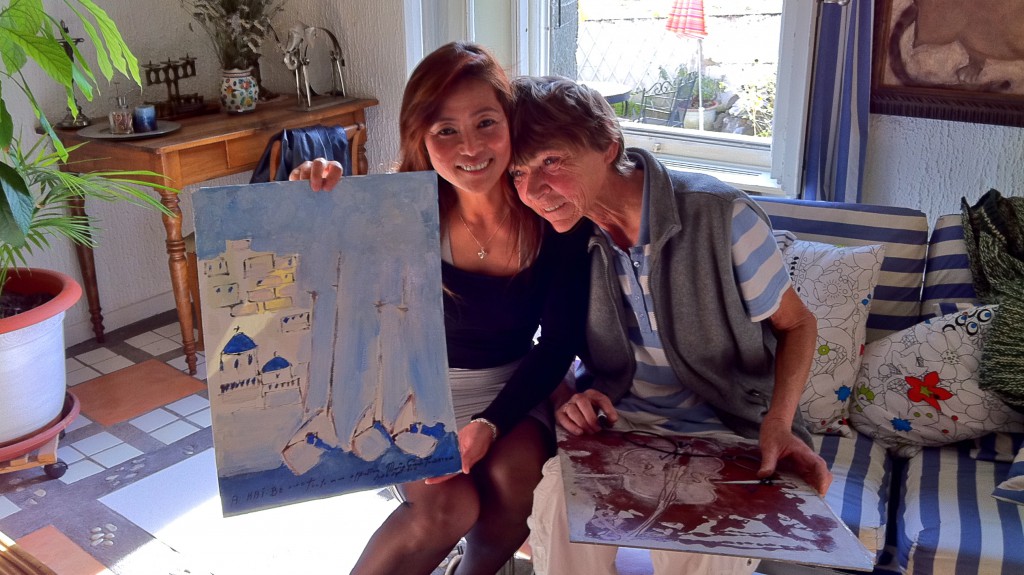
Part V-1 – The Power of Words
Besides the shock, Elizabeth’s divorce affected Ou Yang in other ways. It allowed her to feel less guilty of wanting to step out of her marriage. Guilt does not only belong to Christians, or any other religion, even though it has worked through the ages and could still work in a constructive way; it belongs to any culture that wants to manipulate its people.
Ou Yang now felt better about what she should do next. She did not utter a word about divorce, because Ge Wen was leaving for Vancouver soon and she needed to take advantage of his absence. This secretive plot did not mean that she wanted to continue working on her failed marriage, but that she wanted to see her chances with other men. Ideally, she wanted to find someone else before she made her intentions clear. Should she fail to find such a man, she could just go on pretending nothing had happened and forget about divorcing, since it was something her whole family in China and all of her Chinese friends in Canada strongly opposed.
One thing was for sure: she did not want to date another Chinese man. Even if she had wanted to choose again from her own race, there were not many for her to choose from. The “good” Chinese men stayed married, and the single ones must have had something “wrong” with them if they were still single when they reached 40. Chinese men feel the same way about Chinese women. If women were still single after age 35, people tended to regard them as old, ugly and rigid spinsters. The fact that Ou Yang was over 40, and “aiyo, with a son!” would definitely have eliminated her from the running for the “better” divorcées or the rich older Chinese men who had always had a sea of much younger girls ready to cling to their “merits,” especially in China. The richer ones could always obtain younger “arm-candies” very easily, not necessarily virgins, but with their particular “sexy” girlish giggles and high pitched sweet tones, and definitely without the burden of children.
Ou Yang was not completely disillusioned with marriage, which meant that she was smart enough to see her husband as an individual Chinese man who did not satisfy her needs, and that she still could expect something different from other men, men of other races from whom she had heard nice words and seen nice smiles and good deeds.
She had heard from her friends that lavalife.com was a good site to meet single men, but she could not wait for Ge Wen’s departure to establish a profile to see if there were men out there who could fit into her criteria. The discrimination involved in Ou Yang’s selection of men was truly amazing.
She received a few messages on the first day she published her profile. She clicked on them and saw that some had pictures, and some did not. Dating through a website was quite a novelty for her, and she knew most people would regard it as somewhat bizarre; they were still used to traditional ways of meeting and dating. But Ou Yang had no time, nor did she have a large circle of friends. It wasn’t easy to get to know people face to face, or to befriend colleagues who had worked together for years, and it was hard to imagine the results of meeting men on line, especially western men with their different thoughts and habits. The internet dating thing could be full of fun for doubtful Chinese women who didn’t have the faintest idea of who they might run into.
Without a doubt Ou Yang, like other Chinese women, had illusions about Western men, the cause of which mainly derived from contrasts and abrupt generalization.
Chinese culture praises the merit of being subtle, yet, at the same time, we seem to not have enough words to express our wishes and feelings. Do we not have enough? Or maybe we do, but are too shy to use them, or are unsure about our feelings. Maybe we have doubts about using them. In a word, our ability to express is tied up, with some horrible reasons hidden behind it.
The Chinese language is losing some of its charm on its way to modernization from traditional Chinese, as China has been losing the charm of the great advanced dynasties like Tang and Song, while other parts of the world have gained different, faster ways of thinking with the help of science and technology. Language always follows the fate of the country, and the Chinese language enjoys no exception of this rule. It would be difficult to see the subtle but important effect of language in the development of a country. Even though the complex structures of Chinese words are extremely beautiful, its complexity tangles the country’s development. The simplification of the Chinese language, like the translated vernacular version of Martin Luther’s Bible, is Epoch-making. Both language revolutions made the “heavenly” books accessible to ordinary people, and thus made reading and learning possible for their society.
Language is a tool for culture, politics, and many other social aspects. Han Yu (Chinese) became Zhong Wen with the new socialist China (Zhong Guo means “country in the middle,” so Zhong Wen is the language of the country of the middle). Zhong Wen has gained the vocabularies of communism and socialism after being gradually simplified, and has added many special terms, like the expression “Socialism With Chinese Characteristics” after Deng Xiao Ping visited the South in 1992. Deng Xiao Ping might have saved China from any more words of the leftist socialism represented by Mr. Jiang Ze Ming, and he might have wanted China to develop and enlarge its vocabulary in a modern sense, but the June 4th “event” in Tian An Men Square put doubts into the minds of the Chinese people about the ability of Mr. Deng and his successors to continue the modernization of the Chinese language.
Language should really be more a tool for communication and dating! When Chinese meet, we say: “Have you eaten?” Westerners instead would say: “How are you?” When we chat, we ask: “How much you make?” Westerners would rather figure it out through other pertinent information during the conversation. When Chinese lovers meet, men with no money or social status feel ashamed, and therefore keep silent. They stay cool by being mute- at least “silence is gold,” otherwise they would have nothing left! The richer ones show off their flats and cars, and the women would ask: “how many flats do you have?” If they like the men, they girlishly say “Tao Yan! (disgusting).” Ou Yang was not conscious of this issue, and was not thinking about what she should say.
In life, as it is impossible to avoid subtleties, it is hard to maintain respect and love without subtle languages. Modern Chinese are caught between the clichés and dead subtleties of an ancient language and the abrupt assertions of their immature minds and limited vocabularies to express the most basic concepts. The day China restrained its people’s freedom of speech, their minds started to become lazy, and eventually stopped functioning. When the mind stops thinking, language dies. Language is like a muscle; if it does not get practice, it will wither. We can then imagine how Chinese men and women talk to each other when in love, and when the courtship period has passed.
We Chinese only thought that we lagged behind in economics, and that we had no money. We had no idea about many things that seemed unimportant, including the stagnant situation of our once wonderful language. Western people possess subtler expressions that help grow fine feelings between each other and lend grace to its painful but constantly groundbreaking history. Their language and literature developed, and their vocabulary increased. Free thoughts provided the space for them to grow nice feelings, and words provoked by thinking are there to express the subtleties.
Indeed, Ou Yang had been attracted by the politeness and respect behind the expression:”Would you like to…?” of Marius, and freshly shocked by the concept of appreciation and affirmation in his phrase: ” It is a great pleasure for me be with you!”. On the contrary, the simple statement of “I am sorry, my dear” would take maybe a hundred years for any Chinese to break into saying, especially for parents and authorities to do so in any circumstances. It is very rare that Chinese say to each other: “I trust you!”, because they observed and learned in the society and concluded that trust is not good while money is the immortal truth that could bring happiness and security.
Language also affects relationships. The relationship between Chinese, especially between family members or a couple, has been taken for granted for so long that it has become unbearably tasteless. Kisses are retained for lovers, hugs are kept for parents and their young children, and handshakes are reserved for business relations. And so there is nothing left for parents and adult children, friends, brothers, and sisters, except for “Great Expectations;” we can almost forget those whom we know, who are of no use to us, and we can totally forget about strangers on the street. People in need, those who are missing limbs or are injured, who beg for food, a young girl of 13 who “sings” on the streets to pay for her tuition…the Chinese have absolutely nothing for them, not even the warmth of a glance, because there are just too many of these unfortunate souls and our kindness is bleakly shy for the scarcity of words and reluctancy of smiles that cost us nothing to utter and shine , and maybe cost nothing to take, but would make a difference if we believe that they have the meanings we intend.
Elizabeth, a pious Christian, and her well-informed and educated husband Jonas Larson had shown Ou Yang the niceties of Western values and behaviors, which Ou Yang had mistaken for Western reality in general. Bearing in mind that Ou Yang had only ever left the old city of Xi’An, China to spend about eight years in Quebec, in her eyes Europeans, Americans, Canadians, and Quebecers were more or less the same. The differences between people boiled down to family upbringing, profession, and level of education. Particular local history with its events that happened in different times were not taken into consideration when she encountered a new society, and especially when she was not equipped with the intelligence to understand. Nevertheless, Elizabeth and Jonas had planted a vague hope in Ou Yang’s mind a long time ago, with their polite, respectful, colorful, and joyful languages and their abundant wonderful words, along with the niceness, subtleties and sincerity of their connotations.
That is the power of words, the foremost of all wonders, which makes us fall in love with and trust the world we create with, the adjusted balance of which might take time and pain to discover, and which might never be found.
To be continued…



Recent Comments